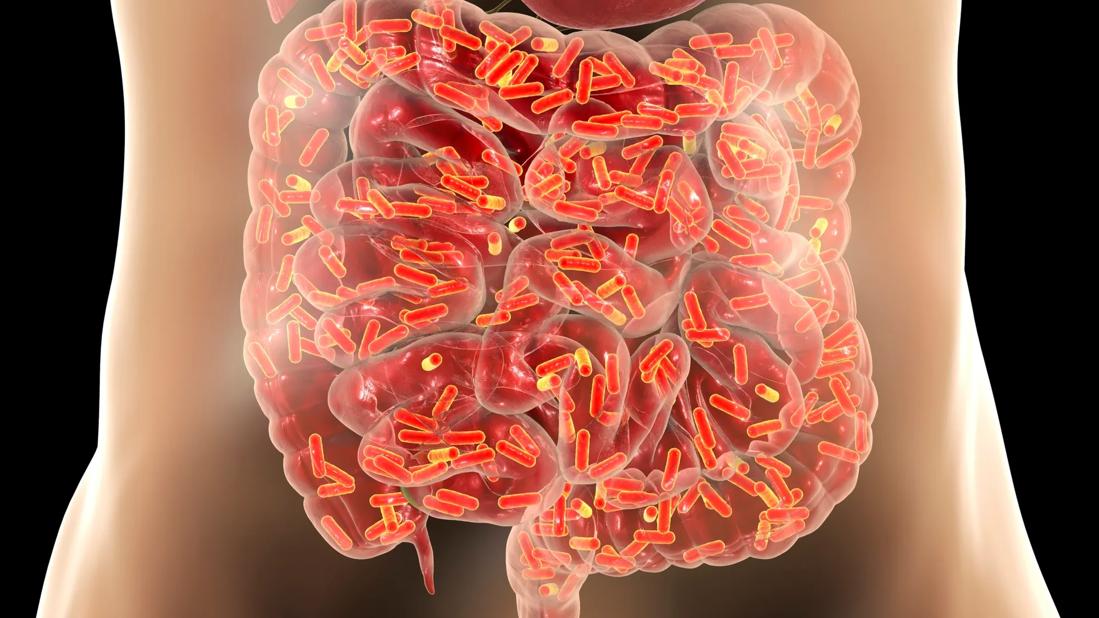Metabolites from animal product substrates implicated in heart failure development in community cohorts

Image content: This image is available to view online.
View image online (https://assets.clevelandclinic.org/transform/71a7fbf6-2f17-45a3-b07a-f5683e5b993c/gut-microbiome-GettyImages-1196631691)
gut microbes in the human intestine
Certain dietary substrates and gut microbe metabolites involved in the trimethylamine N-oxide (TMAO) pathway are associated with development of heart failure, regardless of the presence of other cardiovascular risk factors. Specifically, elevated levels of circulating TMAO, choline and crotonobetaine were independently identified with increased risk in an investigation published in Circulation: Heart Failure (Epub 2024 Aug 9).The study assessed serial measures of TMAO pathway dietary factors and gut microbe metabolites in the blood in nearly 12,000 adults who had been followed for a median of 16 years.
Advertisement
Cleveland Clinic is a non-profit academic medical center. Advertising on our site helps support our mission. We do not endorse non-Cleveland Clinic products or services. Policy
“This study shows that blood levels of TMAO identify individuals at future risk of developing heart failure among a large and varied community of apparently healthy subjects followed over time,” says senior investigator Stanley Hazen, MD, PhD, Chair of Cardiovascular and Metabolic Sciences and Director of the Center for Microbiome and Human Health in Cleveland Clinic’s Lerner Research Institute. “It adds to the growing body of evidence linking the gut microbial TMAO pathway to cardiovascular disease.”
For the past decade, Dr. Hazen and his colleagues have conducted numerous studies assessing different aspects of cardiovascular disease in relation to the TMAO pathway used by microbes in the gastrointestinal tract. Gut bacteria convert dietary choline (primarily from egg yolks, meat and dairy products), L-carnitine (from red meat) and, to a lesser extent, betaine (from certain vegetables, grains and shellfish), to TMA, which the liver metabolizes to TMAO. TMAO can also be directly ingested from fish and shellfish.
Numerous clinical studies have linked high blood levels of TMAO with mortality, atherosclerosis, coronary artery disease, thrombosis, chronic kidney disease and abdominal aortic aneurysm. Animal studies have implicated a high-choline diet leading to increased TMAO with adverse cardiac remodeling and heart failure progression. TMAO levels also have been associated with prevalent acute decompensated and chronic heart failure; however, no prior studies have assessed the possibility that TMAO — or other metabolites involved in its pathway — may play a role in the development of incident heart failure.
Advertisement
This pooled analysis used two multicenter, community-based, longitudinal cohorts totaling 11,768 individuals, after excluding those with baseline heart failure or who were using antibiotics. The cohorts were from:
Extensive physical and laboratory assessments were performed at baseline and periodically thereafter. Analyzed TMAO pathway metabolites in the blood included TMAO, L-carnitine, choline, betaine, γ-butyrobetaine and crotonobetaine. More than 20,000 evaluations of TMAO levels were performed.
During a median follow-up of 15.9 years, 2,102 cases of heart failure were reported. After adjusting for traditional cardiovascular risk factors, risk of incident heart failure was found to be increased with elevated levels of the following (all P < .001):
Associations were generally consistent across age, sex, body mass index, baseline renal function and heart failure subtypes based on left ventricular ejection fraction, but they were generally stronger among Black and Hispanic/Latino participants relative to white participants.
Advertisement
The authors note that the study’s use of large cohorts with subjects assessed before they had evidence of heart failure provides strong support for its findings. Another strength of the investigation was its assessment of less-studied gut microbial TMAO-related metabolites such as crotonobetaine, which proved to be independently associated with heart failure development, suggesting another avenue for future research.
“Findings from these well-described community cohorts build on evidence from animal models and further support the clinical relevance of the TMAO pathway in the progression toward heart failure,” says first author W. H. Wilson Tang, MD, Research Director for Heart Failure and Cardiac Transplantation Medicine at Cleveland Clinic. “This study highlights the need to gain better insights into how best to intervene to prevent the development of heart failure in at-risk individuals.”
Other TMAO pathway studies by this research team have helped elucidate mechanisms in the development of cardiovascular and renal diseases and suggest a role for pharmacotherapeutic interventions. For example, evidence from animal models has shown that inhibiting a key step in choline conversion to TMA reduces adverse fibrotic responses to elevated circulating TMAO in the heart and kidney.
“We may one day routinely use blood TMAO levels to predict heart failure risk,” Dr. Hazen states. “For patients with high levels, strategies to inhibit TMAO production by dietary and pharmacological means might prove useful.”
Advertisement
Advertisement
Experts are challenging the one-size-fits-all paradigm
Decongestion, therapy titration and readmission rates comparable to those with traditional hospital care
Panel proposes staging and treatment protocols that support harmonized evaluation and management of heart failure in patients with congenital heart disease
Eminent clinician-researcher brings special expertise in nutritional interventions for heart failure
Recent volume and outcomes data in two major realms of cardiovascular care
Volatile organic compounds have potential in heart failure diagnostics
Basic understanding of condition and treatment is lacking
Indications and issues concerning cardiac resynchronization therapy, conduction system pacing